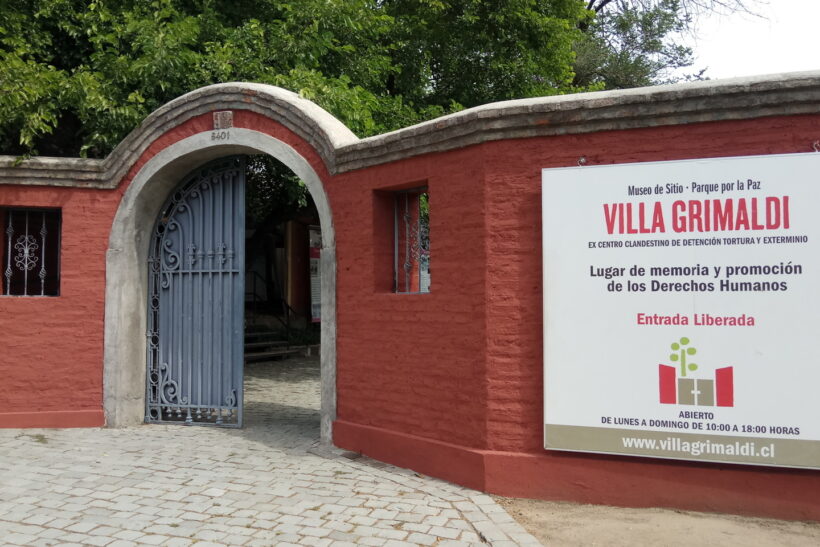I have noticed the angry reaction of many people to the invitation that Fundación Futuro (linked to Sebastián Piñera’s family) made to an event offering to go wine tasting at Viña Concha y Toro and then go on to visit the Villa Grimaldi torture centre. In today’s El Mercurio, columnist Carlos Peña, in his most benevolent interpretation, called it “moral stupidity”, a kind of inability to notice the charge of pain and the profound profundity of a place like Villa Grimaldi and, in his harshest interpretation, an intentional act of wanting to strip the place of its meaning and turn it into a kind of entertainment fair. But I believe that this is neither stupidity nor malignity, but simply a true reflection of the lack of empathy that is generated in one ideological sector towards another, which translates into a very insensitive attitude towards the memory of pain when it is felt as something foreign.
By Ricardo Baeza Weinmann
It is not merely a problem of understanding, as if it were only a cognitive difficulty that prevents us from grasping the reality of the suffering of others. The obstacle here is emotional, not rational. There is so much distance between the experiences of the two ideological sectors that the possibility of finding common elements that would lead to understanding and being in tune with those experiences is lost. And when an emotional reaction of pain is not spontaneously awakened in tune with what the other feels, the inability to recognise and validate the experience of suffering arises. If the only possible approach to the experience of another’s pain is through the use of reason, only a space of ideas is established where the relevant thing would be a mixture of ideas together with the intensity of emotional experiences, one’s own, which are spontaneously awakened in the face of the horror of the other’s suffering.
Without this emotional empathic component, it is absurdly easy to begin to populate the reflective space with a multiplicity of ideas that rationalise what is perceived; that justify the actions of horror by assigning degrees of guilt to the victims; that suggest the existence of a supposed context of war where what really happened was political repression; that suggest a sort of “draw” when citing some cases of horror coming from the other ideological side; that understand the horrors committed as mere collateral damage in the face of the need to preserve a way of life considered correct and safe. A whole host of concepts which, in the absence of real empathetic pain, are left without counterbalance and only end up reinforcing ideological options contrary to those who have suffered the damage.
Because let us not deceive ourselves, although ideas appear to operate in a context of rationality, in reality they are always at the service of the emotional dimension, the one that gives them FORCE and directs them by biasing our perception of reality. No one would want to assume that they have chosen to defend an ideology that is evil in its essence and perverse in its practice (whatever its sign), so the mental space that this emotionality generates is the one that allows only certain favourable ideas to be established, while the other unfavourable ones are discarded. And so it is that the resulting attitude, apparently cold and rational, does not in fact imply coldness at all. It is only the expression of an intense emotionality, one’s own, which fights and rebels against considering itself part of evil, against feeling itself a member of a side causing profound pain; and takes it upon itself to install apparently well inspired ideas in place of true empathetic emotions. “We must look at the issues with a clear vision”, “we must overcome the pain”; “we must look to the future, not get bogged down in the divisions of the past” or “we must turn over a new leaf once and for all”.
The fact that people are invited to taste wine and visit a torture centre on the same day, even if it is very undignified, I don’t think that this is the real problem. I think it would be perfectly possible to carry out both events with the dignity and respect due to the level of each in their own right. The critical point, for me, is that the approach to the visit to Villa Grimaldi comes from a sector that has never given a credible sign of empathising with the underlying pain of those who suffered under the dictatorship. So, I suspect that the visit would be full of rationalisations and justifications aimed at reaffirming their own ideological positions, which makes it very difficult, if not impossible, to truly taste the profundity and dimension of the pain shown there.
Maintaining a site of memory such as this is not for feasting or for taking a selfie, it is to help us not to forget and to reflect, so that we strive to never again repeat the same atrocities as a society.










